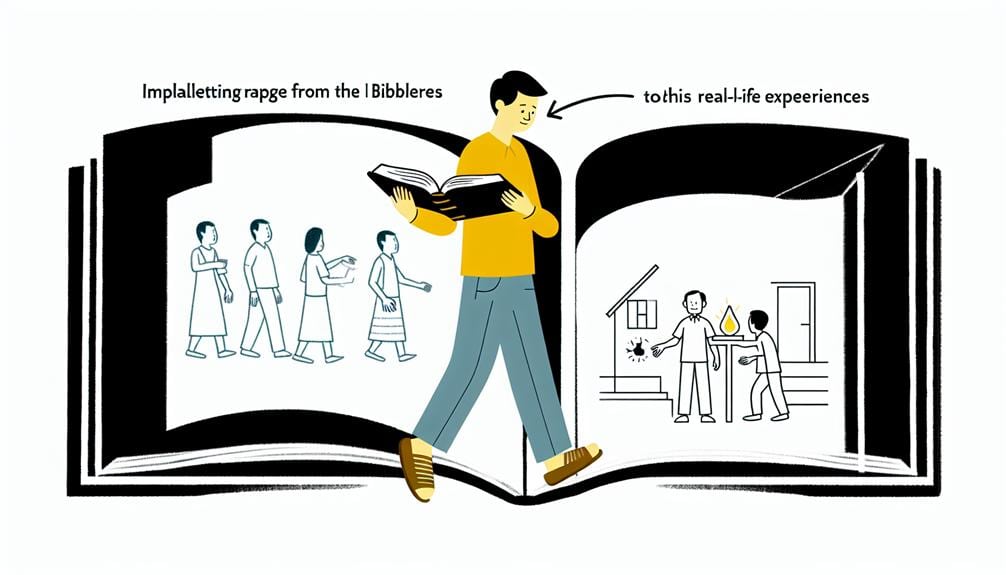How To Understand The Bible
How to understand the Bible is a question that every newbie asks.
It will involve getting the proper tools that will make understanding it easier.
It will involve knowing the context back then such as the Historical and Cultural Context which tells you what was happening back then and what the culture was back then. It will involve moving from Observation to Interpretation and then to Application.
So, you’ve found yourself sitting down to read the Bible, but as you start, you quickly realize that understanding its message is no easy task. Take, for example, the story of David and Goliath. At first glance, it may seem like a simple tale of an underdog triumphing over a giant.
But as you dig deeper into the book, you uncover layers of meaning and symbolism that leave you questioning if there’s more to this story than meets the eye.
I admit that the Bible was one of the most confusing books I tried to read when I was young. I found the King James Version to be so confusing to read as it used strange words such as Thou and Begath.
I had never heard of those words before so it was intimidating to read.
I mean Who talks like that?
I am sure you can relate to that.
It was only after reading the New International Version that was I able to understand the bible better and become closer to developing a relationship with Jesus Christ.
I believe the translation you use can help you a lot to understand the bible better such as the Christian Standard Bible.
If you’ve ever felt confused or overwhelmed while asking how to understand the Bible just like I was, fear not, for there are practical steps you can take to unlock its wisdom, gain a clearer understanding and gain spiritual nourishment.
One word of warning is that you need to be a Christian to know how to fully understand the Bible.
1 Corinthians 2:14 The natural person does not accept the things of the Spirit of God, for they are folly to him, and he is not able to understand them because they are spiritually discerned.
Before we delve into the steps, let’s explore why understanding the Bible is important.
Key Takeaways
- Understanding the Bible provides wisdom and guidance for life.
- Context is crucial for illuminating the intended meaning.
- Utilizing study Bibles, commentaries, and online resources enhances understanding of the Bible.
- Bridging understanding with life application integrates the Bible into everyday life.
Introduction

To begin your journey into understanding the Bible, it’s important to grasp the fundamental concepts and context that form its introduction.
I remember when I was being trained in learning how to understand the Bible I had to get a good Study Bible that had introductions to each book.
The introduction in a Study Bible sets the stage for the entire Bible, providing a framework for interpretation and guiding your understanding of the whole story.
When embarking on Bible reading or study, it’s crucial to familiarize yourself with key terms and concepts that will aid in your comprehension.
The introduction section of a Study Bible encompasses various elements, such as the authorship, historical context, and literary genres employed throughout its pages. By understanding these aspects, you can better grasp the intended meaning behind the words and gain a deeper appreciation for the overall message.
This answers the questions we may have such as who is talking to whom and what was happening during the time of when it was written.
Additionally, becoming familiar with keywords and their significance can help you navigate the text and discern the central themes and ideas.
To truly understand the Bible, it’s essential to approach it with an open mind and a willingness to engage in thoughtful reflection.
By recognizing the importance of the introduction and the role it plays in shaping your understanding of God’s word, you’ll be better equipped to embark on a meaningful and transformative journey through the pages of Scripture.
Principles that show How To Understand The Bible
Developing a strong foundation for understanding the Bible begins with adopting principles that will guide your reading of Scripture. By following these principles, you can gain a deeper understanding of the context, history and meaning behind the words on the page.
To read Scripture well, consider the following principles:
- Context is key: Always read a passage in its proper context. This includes understanding the historical and cultural background, as well as the literary genre of the text. Context helps to illuminate the intended meaning of the Scripture. If you are reading Chapter 12 of a book it will be helpful if you read Chapter 11 first.
- Scripture interprets Scripture: Allow Scripture to interpret itself by comparing different passages and seeking the harmony of its teachings. This helps to avoid misinterpretation and ensures a more accurate understanding.
- Prayerful reading: Approach the reading of Scripture with a humble and prayerful heart. Ask the Holy Spirit to guide your understanding and illuminate the truth found in the text.
- Active engagement: Engage with the text by asking questions, seeking a deeper understanding, and reflecting on its application to your life. Actively reading Scripture allows for personal growth and transformation.
Tools to Aid Your Understanding

Understanding the Bible requires utilizing various tools that can aid your interpretation of the text. These tools are designed to help you navigate the complexities and nuances of the Scriptures, allowing you to gain a deeper understanding of its message in the Old Testament and New Testament.
One such tool is a good study Bible, which typically includes helpful notes, cross-references, and explanations that can provide valuable insights into the meaning of the text. It can also contain maps, charts, and timelines that help you visualize the historical and cultural context of biblical events.
A good study Bible will also have explanations of each verse to point you in the right direction
Commentaries are another valuable resource for understanding the Bible. Written by biblical scholars and experts, commentaries provide in-depth analysis and interpretation of the text. They can help clarify difficult passages, provide historical and cultural context, and offer alternative perspectives on the meaning of the text.
Concordances and word lexicons are tools that can aid your understanding of the original languages in which the Bible was written. They provide definitions, usages, and references for every word used in the biblical text itself, enabling you to explore the deeper meanings and nuances of the original Hebrew and Greek words.
As a beginner, I won’t recommend you pick up lexicons as it can be confusing and it is for more advanced Bible Scholars.
Lastly, online resources and apps offer a wide range of tools and aids to help you in your study of the Bible. From Bible study software to online bible study and guides, these resources can provide instant access to a wealth of information and insights that can enhance your understanding of the Scriptures.
Developing Your Interpretive Lens
Gaining a fresh perspective on the Bible involves cultivating a discerning and open-minded approach to its teachings. To develop your interpretive lens, there are several key aspects to consider:
- Understanding God’s Word: Recognize that the Bible isn’t just a book, but the inspired Word of God. Approach it with reverence and humility, seeking to uncover its deeper meaning.
- Relying on the Holy Spirit: Invite the guidance of the Holy Spirit in your study of Scripture. The Spirit can illuminate the text and reveal its truths to you, helping you interpret it accurately.
- Considering Historical Context: Recognize that the Bible was written in a specific historical and cultural context. Take the time to research and understand the background, customs, and traditions of the time, as this can provide valuable insights into the meaning of the text.
- Engaging with Various Interpretations: Be open to different interpretations of the Bible. Engage with theologians, scholars, and fellow believers to gain different perspectives and deepen your understanding.
Bridging Understanding with Life Application

To fully integrate the lessons of the Bible into your life, it’s essential to bridge your understanding with practical applications. Understanding the Bible isn’t just about gaining knowledge; it’s about applying that knowledge in a way that’s contextually relevant to your everyday life.
When reading the Bible, it’s important to ask yourself, ‘How does this one verse or passage apply to me?’ This requires digging deeper into the text and considering its implications for your circumstances. By bridging your understanding with life application, you can derive meaning and guidance from the scriptures and verses that directly impact your life.
One way to bridge understanding with life application is by seeking out relevant examples or stories in the Bible that parallel your own experiences. This helps make the lessons more relatable and applicable to your situation.
Another approach is to pray and reflect on how the principles and teachings in the Bible can be practically implemented in your daily life.
Conclusion
As you can see learning how to understand the Bible is a lifelong journey that requires continuous effort and an open heart. It isn’t simply about reading the words on the pages, but about delving deep into the words and discovering their meaning.
By studying the historical and cultural context, you can gain a clearer understanding of the messages conveyed in the Bible and how they apply to your life today.
As you strive to understand the Bible, remember the following:
- Context is key: Take into account the historical, cultural, and literary context of the passages you’re reading. This will help you grasp the intended meaning and avoid misinterpretation.
- Seek guidance: Don’t be afraid to seek guidance from trusted spiritual mentors or scholars who can provide insights and perspectives that may enhance your understanding.
- Stay open-minded: Approach the Bible with an open mind and heart, allowing the words to challenge and transform you. Be willing to let go of preconceived notions and embrace new understandings.
- Apply it to your life: The ultimate goal of understanding the Bible is to apply its teachings to your life in a contextually relevant way. Look for practical ways to live out the principles and values that the Bible teaches.
Frequently Asked Questions
What Is the Historical Context of the Bible?
To understand the historical context of the Bible, you need to explore the time and place in the world in which it was written. This includes studying the cultures, customs, and world events that influenced its authors.
How Do Different Translations of the Bible Impact Its Meaning?
Different translations of the Bible impact its meaning by providing alternative ways of looking at the text. Exploring different versions of the Holy bible can help you gain a broader perspective and deeper insight.
Can I Trust the Accuracy and Reliability of the Bible?
You can trust the accuracy and reliability of the Bible. It has been meticulously preserved and studied by scholars for centuries. Its teachings have stood the test of time and continue to reach and impact countless lives.
Inspirational Story
Martin Luther agonized over the Bible. As a 16th-century Augustinian monk and professor of theology in Germany, Luther yearned to comprehend truths he sensed hidden within its pages. Yet despite his religious training and rigorous study, there were parts of Scripture that perplexed him.
In particular, certain passages written by the apostle Paul about righteousness and “the righteousness that comes from God” confounded Luther. He could not fully grasp how sinful human beings could be made righteous in God’s sight. The formulaic Catholic theology of his day provided little insight.
This lack of understanding tormented Luther, driving him to spend countless hours in prayer, reflection, and searching academic libraries for enlightenment. He pored over Scripture in Hebrew and Greek, determined to grasp the heart of the text. Gradually, Luther began to understand the transformative concept of righteousness by faith.
Through diligent struggle and seeking over many years, Luther experienced a breakthrough. Key passages once mysterious suddenly made sense in light of fresh revelation that would fuel the Protestant Reformation. Luther emerged from the crucible of questioning and settled in greater understanding – one upon which he staked his life. His journey makes clear that grappling honestly with Scripture leads to discovering profound yet difficult truths.








Amen. This is very rich feedback. I struggle many times reading the bible, but I keep going because eventually, God will make it all make sense. I would even encourage reading the bible along with a Bible group or spiritual mentor or using online resources to guide your understanding. I enjoy using Got Questions as a way to understand the text.
Yes got questions is a really good resource as well!
This is a comprehensive guide on understanding the bible. I totally agree that to understand and grasp the wholeness of the scripture, one needs to get a thorough idea of the time and the culture in which it was written. Thanks for putting this awesome resource together.
Yes that is very true!